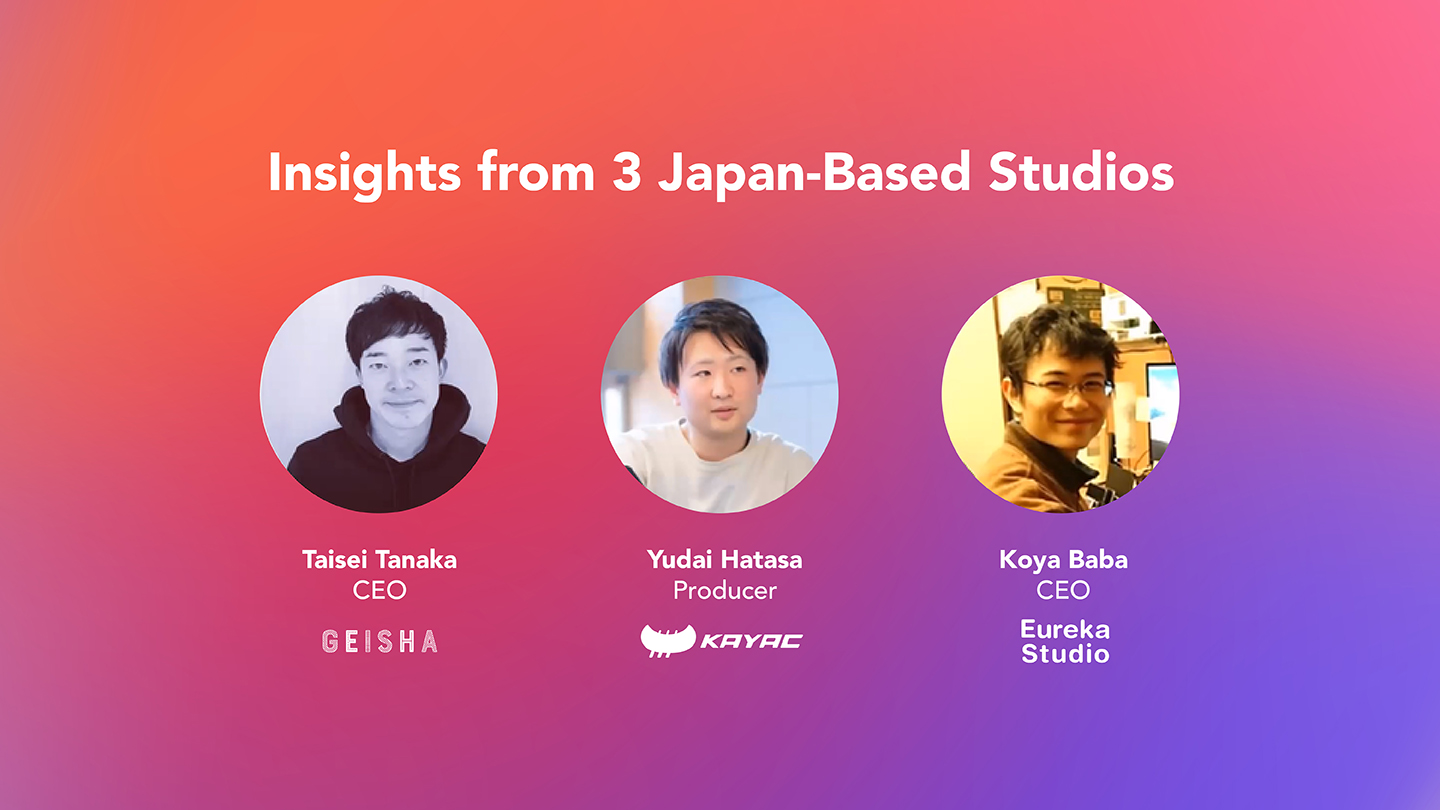Gaming, Industry News & Events
Reaching No. 1 and Developing Unique Game Ideas: Insights from 3 Japan-Based Studios
Oct 8, 2020

Gaming, Industry News & Events

Earlier this summer at Game Business EXPO, Tomoya Katagi, Manager of Business Development at AppLovin Japan, moderated a panel with guest speakers from Geisha Tokyo, Kayac, and Eureka Studio. All three Japanese developers reached no. 1 on the U.S. App Store charts with their hyper-casual games.
The three panelists talked about their secrets to success, including their development process and how they come up with unique game ideas.
The panel began with how each company develops its team structure and the overall process of planning a new game. Taisei Tanaka, CEO of Geisha Tokyo, discussed how his development process has evolved over time.
In the early stages, Geisha Tokyo focused on developing a high volume of different games, but now they have a more formal process. Currently, the studio leverages the strengths of each member to have each person handle a different genre. They also have a predefined day to submit proposals before choosing projects to move ahead in the pipeline based on feedback from other members.
Taisei, who also handles the hiring of new employees, said, “Many new hires think they’ll get a plan handed to them, but we want them to develop the ability to create a plan from scratch and develop a game themselves.”
Yudai Hatasa, the producer at Kayac, allows engineers to propose what they want to work on. Over the course of discussion and testing, they determine whether the game could be a success.
Yudai said their process isn’t as formal as Geisha Tokyo’s.
So, how exactly do teams come up with ideas for their games?
When Geisha Tokyo first started developing games, the team analyzed the top 100 mobile game rankings to understand current trends. After gaining experience and traction, they forecasted where those rankings would be within two months.
Now satisfied with their understanding of the game space, Geisha Tokyo looks for inspiration in everyday life for new and interesting ideas. To further explain, Taisei used COVID-19 as an example.
Before the pandemic, the team went on a retreat to Amami Oshima island. They didn’t bring enough power strips and as a result, faced the challenge of not having enough electrical outlets for the team to plug in. This led to the inspiration for Recharge Please!.
Traffic Run! was also inspired by a real-life experience after Taisei experienced a traffic accident in Silicon Valley.
Similarly, Koya Baba of Eureka Studio told the group, “I’m always paying attention to my surroundings and treat life as a springboard for game development.”
His experiences of hating school and always cutting class inspired him to create Skip School!. He revealed that some of the levels are based on his true-life stories.
Yudai and Koya also gave their approach to staying on top of fast-moving game trends. Koya noted, “At one point, I tried to develop games by looking at what was popular at the time, but trends come and go very quickly. By the time you spend one to two months developing and releasing a game, a trend may have already expired.”
He said that Park Master was a reaction against that, and was developed because the team personally found the game fun to play.
Koya stated that his team takes numerous approaches—sometimes they focus on popular genres, other times they examine older trends. He added that they are also building up some brand new ideas that are not based on existing trends, nor reference past hits.
Making great games means hiring the best talent. The discussion around hiring focused on how the studios implement their search for up-and-coming talent.
Taisei from Geisha Tokyo said, “At a minimum, you have to play all of the hyper-casual games that have been popular over the last two to three years. Studying them and understanding the framework of these games makes it easier to actually implement a plan.”
Koya said he asks new employees to focus on a specific genre and pitch ideas. Instead of asking for an interesting hyper-casual game, they ask new talent to focus on a single genre. This is an easier way for them to come up with ideas and speed up development.
The discussion wrapped up with how to stay prepared for changes in trends and a desire to continue making more hit games.
AppLovin had a great time moderating this panel with three talented Japanese developers who reached #1 with their hyper-casual games. We hope to see more Japanese developers conquering the charts!
Looking to build your first great game? Check out our videos with our Head of Games, Keith Kawahata, who gives you a checklist of what to think about.
Here’s part two of “How do I get started making my first game?”